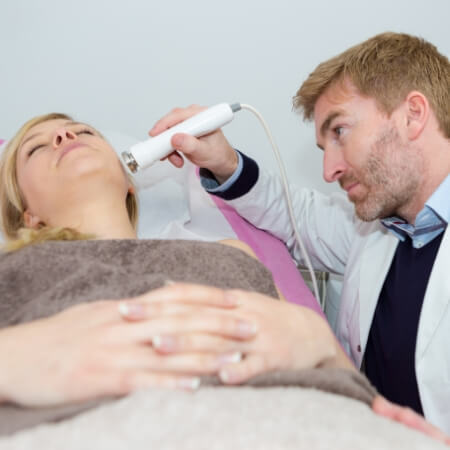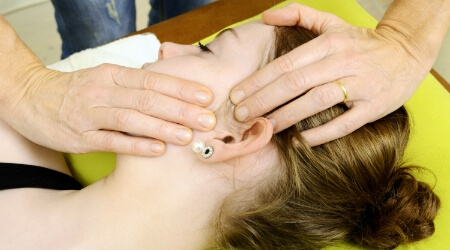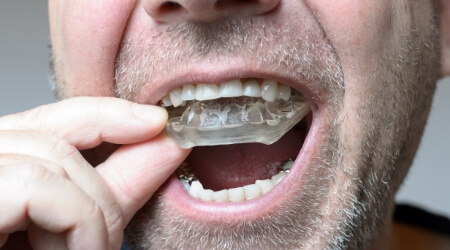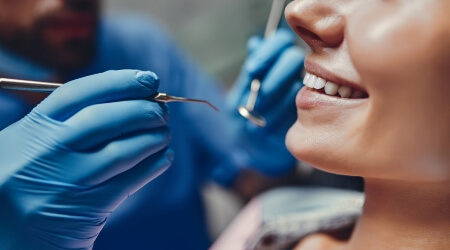TMJ Treatment – Lewis Center, OH
Helping Ease Jaw Tension & Discomfort

Do you experience lockjaw, jaw pain, migraines, or tension in the cheeks and face? These are all common signs of a condition known as temporomandibular joint dysfunction, or TMD. Our dentistry team offers comprehensive dental treatment plans to help minimize jaw pain as well as preventing additional damage from occurring down the road. To learn more about this condition and whether you may have it, call our dental office to schedule a consultation today to discuss diagnosis and TMJ treatment.
Why Choose The Dental Group at Polaris for TMJ Treatment?
- We Accept & Maximize Dental Insurance
- Experienced & Friendly Dental Team
- Customized Nightguards for Teeth Grinding
What is TMJ/TMD?

The temporomandibular joints are where the region in your skull, known as the temporal bone, touches your mandible, your lower jawbone that keeps your lower bottom teeth in place. Your TMJ gives your jaw certain functionality, like allowing it to move up and down and from side-to-side.
What Causes TMJ/TMD?

There are several reasons why your jaw joints can cause you pain. Some common ones include:
- Genetics
- Arthritis
- Anxiety
- Stress
- Injuries
Genetics

Some individuals are more susceptible to TMD than others. While both men and women are often diagnosed with TMD, it is more common among women than men. Some people may also be predisposed to TMD.
Arthritis

Over time, the interior of your temporomandibular can weaken and depreciate. This can be caused by a specific type of arthritis called osteoarthritis. This type of arthritis is more commonly seen in older patients than younger ones.
Stress

Certain pressures on your TMJ, like clenching your jaw, can eventually turn into TMD. You may be putting pressure on your TMJ and clenching the muscles throughout the day and aren’t aware you’re even doing it. This subconscious stress can also lead you to grind your teeth.
Teeth Clenching or Grinding

Many individuals clench or grind their teeth throughout the day or night without even noticing they’re doing it.
Injuries

TMD is caused when there are certain stressors or displacement in your TMJ. An injury like a dislocated jaw can lead to TMD. Studies show other trauma, such as an instant blow, can also result in TMD.
TMJ Treatments

Fortunately, our team at The Dental Group at Polaris is specially trained to combat TMD with several different treatment options. Many of these treatments are painless. We also offer more sophisticated treatments to help alleviate your pain caused by TMD.
Changing Your Diet

Adjusting your diet to include more soft foods may relieve some pain caused by TMD.
Hot/Cold Treatments

While every patient is unique, we may suggest a hot/cold treatment to help alleviate some pain associated with TMD.
Medication

You can take immediate action against TMD with over-the-counter medicine. We may prescribe you medication if you are experiencing more severe pain.
Stress Reduction

Stress reduction therapy, massages, and meditation can help diminish the pain and pressure on your TMJ.
Physical Therapy

There are specific exercises you can practice to alleviate pain caused by TMD. Make sure to speak with a professional before engaging in physical therapy.
Nightguard

A nightguard can be used to keep your bottom and top teeth from grinding and clenching at night. We may also suggest wearing a dental guard throughout the day
Dental Work
If you have missing, damaged, or misaligned teeth that are triggering stress and pain, we may use crowns, partial dentures, or orthodontic aligners to help alleviate these discomforts.
Signs of TMJ/TMD

If you experience pain that you suspect may be caused by TMD, we suggest making an appointment with us before these problems worsen.
Pain or discomfort associated with TMD can include:
- Trouble opening your mouth
- Fatigue in your face
- Tenderness or pain in your teeth, jaw joint area, face, ears, neck, head and/or shoulders
- Trouble chewing
- Your jaw gets stuck open or closed
- Swelling in the sides of your face
- Trouble speaking
While these can be symptoms of other issues, we suggest making an appointment to see us so we can better assess the situation. We’ll check your jaw and bite during your examination to see if you have any signs of TMJ issues. This, along with X-ray images can aid us in diagnosing TMD.
The Dental Group at Polaris has helped clients with TMJ issues for over 31 years. While some TMJ issues are fairly easy to fix or alleviate, others require more attention.
If you experience any pain or discomfort mentioned above, call us at (614) 888-3692 to have your TMJ examined by our knowledgeable staff. With over three decades of experience, we have the knowledge and expertise to properly diagnose and treat your TMD.
